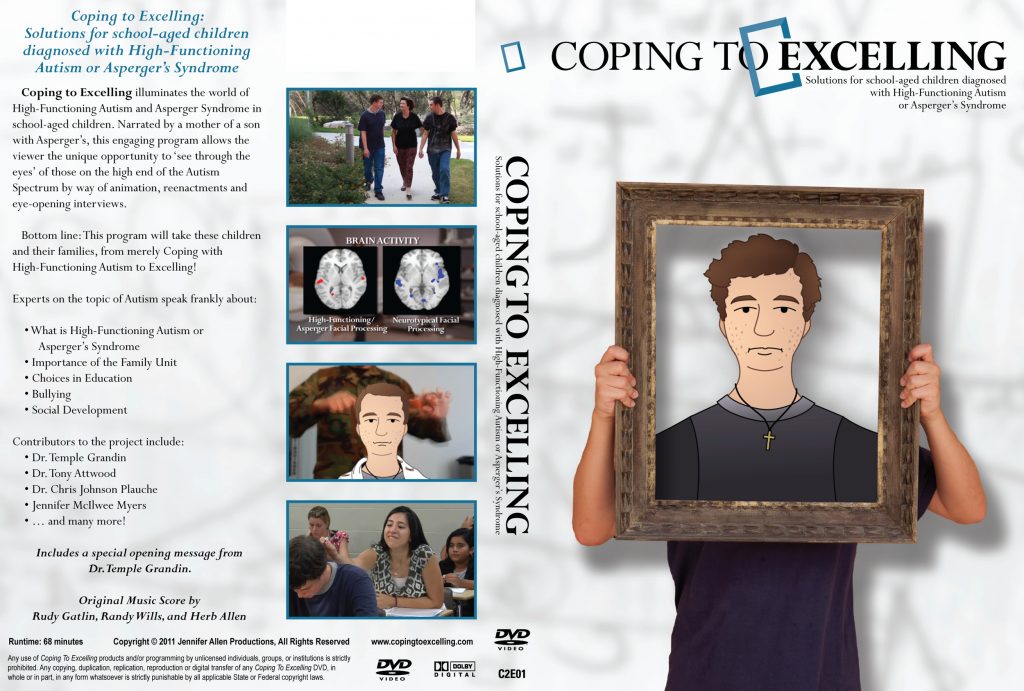
According to Dr. Tony Attwood, “When I meet someone with Asperger’s and explain the diagnosis to them, I say, Congratulations! You have Aspergers Syndrome. You’re different. You’re not mad, bad or defective. You’re just different like being left-handed in a right-handed world.”

Dr. Chris Plauche states that we are starting to understand the functions of the brain and we realize that Autism really is neurobiological — different wiring, miswiring, atypical wiring, whatever you want to call it. We are in the fetal stage in understanding all of this and I think that once we understand this more, we will be able to subtype this Autism spectrum. Right now we know for sure that folks with Aspergers have atypical function in the Fusiform Gyrus which is the part of the brain that emotionally recognizes familiar people.

Janessa Manning’s area of study is Neuroscience Imaging with a focus on discovering Autistic Minds. “The brain of your child, who has been newly diagnosed with High-Functioning Autism or Aspergers, is different and functions in different ways than a typically developing child. This is not a choice the child is making; we see actual neurological differences when we query by both anatomy and function. So there is a great importance to getting therapy and getting treatments, well-defined efficacious treatments, and trying to improve the behaviors but understanding that they are coming from a place of being different neurologically.”
Wow! That is a strong statement and bears repeating. The High-Functioning Autistic or Asperger brain is different, in its function and in its anatomy. This is not a choice the child makes. In other words, it’s not bad parenting nor bad behavior, they are wired differently! Manning goes on to say someday soon imaging should eventually aid in diagnosing Autism based upon brain biomarkers.
Manning goes on to say that now we don’t have to wait for behavior to occur to make a diagnosis. We can actually look at changes in the brain between subjects on the Autism spectrum and between a typically developing controlled, and actually see the changes on the brain. That is really exciting.
Along with the diagnosis of High-Functioning Autism, or Aspergers Syndrome, may come other disorders or cormorbidities. Dr. Plauche says medically speaking, children with Aspergers Syndrome are very healthy, but sometime it’s other conditions that may require medical attention.

The primary concern in children with Aspergers are the comorbidities, the psychiatrics cormorbidities; and there are several of them – Anxiety disorder, depression, ADHD, obsessive compulsive disorder and really the whole range, but those are the four biggies. If the child with Aspergers has one or more, and often times they have 2 or 3 of them, those psychiatric challenges can be a lot more disabling than the Aspergers itself.
If you suspect your Autistic or Aspergers child is challenged with any of these additional disorders, first getting a diagnosis is imperative so you’ll be able to understand and treat these potential obstacles. Our son, Sam, has ADHD and also developed OCD as he entered High School. Our choice was to provide a mild dose of an anti-anxiety medication as well as a few trips to a behavioral therapist. The combination has worked great for Sam but may not be the right combination for your child. Be sure to consult with your doctor.

When we are using these medications with children with Aspergers, we sometimes have to realize that they are hyper-sensitive to the medications, which is not a bad thing, it just means we use a lower dose. It’s always good to use a lower dose. We need to start low and try to slowly upwards the dose, and if we see any kind of deterioration in behavior, go back to the lower dose. I know we hate to think about our children on psychiatric medications, but they really have a good track record, and they can help eliminate those extra little balls of weight slowing them down. We don’t have a medication for Aspergers, but we can take care of these other things and make their life easier so they only have Aspergers.
As Dr. Plauche stated, it’s usually not the Autism but the other psychiatric diagnoses that can be more impairing or disabling than the Aspergers itself.
Treating High-Functioning Autism and Aspergers Syndrome comes in many forms and choices. The most noted and successful treatments are as follows:
• ABA – Applied Behavior Analysis
• Psychotherapy
• Sensory Integration Therapy
• Medication
• Language Communication Therapy
• Social Skills Groups
• Public School Educational Support Programs
• TEACCH – Treatment and Education of Autistic and related Communication-handicapped Children
• Denver and Greenspan Models
Studies indicate that up to 80 percent of people affected with Aspergers Syndrome often experience extreme sensitivities to everyday sights, sounds, smells and touch.
The sensitivities may include:
• Hearing being the most common. They can be easily distracted by noises everyone else can filter out such as the buzz of fluorescent lights. This makes it hard for many to follow conversations or listen to teachers’ direction. Sensitivity to sounds is actually painful making it difficult to take “Aspies” to places such as arcades, restaurants or noisy classrooms. An overwhelming fear of an impending school fire alarm may cause total panic.
• Taste and Smell in some are heightened to the point of nausea. This can make cafeterias, stores and certainly restaurants a painful and fearful experience.
•Touch may also be a factor. If overly sensitive, certain clothing (typically with polyester) may be irritating. Hyposensitivity causes lack of feelings to cold temperatures or very little feeling towards pain.
•Visual problems, though rare, can get upset by certain pictures, colors or bright lights. Some even experience discomfort with colors as if they are sounds.
•Physical challenges also come into play for many with Aspergers Syndrome. Simple activities that require coordination quickly become complex such as hand-eye coordination, handwriting or tying your shoes. That is why playing baseball or any sports can quickly become a nightmare for many on the spectrum.

Coping to Excelling is available on DVD. Click here for more information
A graduate of Abilene Christian University, Jennifer had a long career in TV Broadcasting. Upon learning her oldest son Sam had a form of Autism called Asperger’s Syndrome, she left her career and became a full-time mother to both of her sons. Jennifer elicited the participation of her family and together they produced several independent programs including a children’s animated series titled Ameriquest Kids, as well as a documentary and book titled, Coping to Excelling: Solutions for School-age Children Diagnosed with High-Functioning Autism or Aspergers Syndrome. She formed the nonprofit Asperger101 to provide on-going free resources related to ASD at Aspergers101.com and has implemented the Texas Driving with Disability Program and continues to grow the statewide initiative today. She and her husband have recently retired to their property in the Texas Hill Country.


My son is 13…we are having some mild issues …it hard to figure out what is age and hormones and what. Is from the autism…there seems to be so much help when they are younger but not as much as they get older…